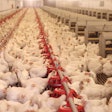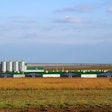What does the current poultry industry have in common with the 1969 Chicago Cubs baseball team and golfer Greg Norman in the 1996 Masters Tournament? Like these famous collapses from front-runners, the perceived fortunes of the poultry industry have faded dramatically.
Confidence reversal
Just three months ago, I reported “confidence in the poultry sector has never been higher.” Now it’s near rock bottom:
- lowest Overall Index ever (44.7 based on 1996 baseline = 100)
- Lowest Future Profits Index ever (26.6)
- Historically low Opportunities and Conditions measures
- Lowest broiler and turkey Indices ever (35.7 and 43.6, respectively)
Poultry outlook wilted with drought
So, what happened? A severe drought has negatively impacted grain harvesting:
- Corn harvest is expected to be 13 percent less than a year ago, resulting in the lowest production since 2006 and the smallest surplus since 1996
- Soybean bushels are forecasted 14 percent below 2011 levels
Costs making poultry operations unprofitable
When coupled with rising energy costs – gasoline prices increased 27 cents per gallon during a single month – and the inability to pass on costs even though food prices were up 6 percent during July, poultry producers are forced into unprofitability.
Although some poultry producers have compensated with reduced production, third-quarter trends are nearly equal to a year ago (although year-to-date placements are down 3 percent).
Poultry retains edge in consumer value
The only bright spot for the foreseeable future is the widening value gap of poultry, relative to other protein sources. The competitive efficiencies of poultry have made chicken products more attractive to consumers than beef or pork.
Increased demand should help integrators weather this storm, but a return to long-term profitability will require significant changes in market conditions.













